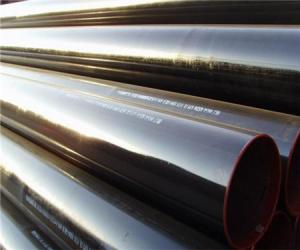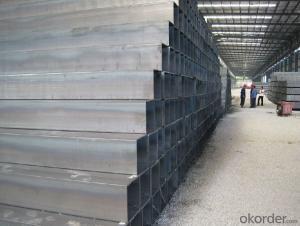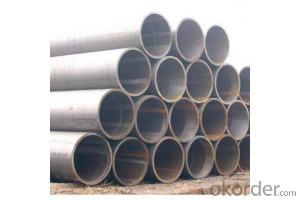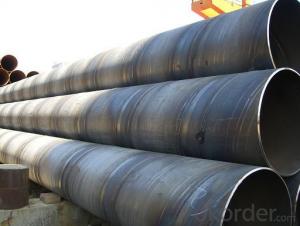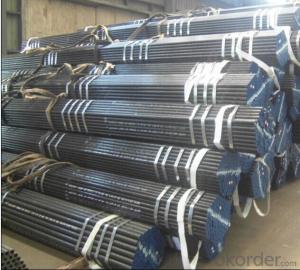API 5L SSAW Carbon Steel Welded Construction Steel Pipe
- Loading Port:
- Tianjin
- Payment Terms:
- TT or LC
- Min Order Qty:
- 20 m.t.
- Supply Capability:
- 15000 m.t./month
OKorder Service Pledge
OKorder Financial Service
You Might Also Like
1、Structure of API 5L SSAW Carbon Steel Welded Construction Steel Pipe:
ERW steel pipe is electric resistance welding, the abbreviation for ERW for transporting oil and natural gas vapor liquid objects, can meet the requirements of high and low pressure, the transport in the world with pipe sector accounted for a pivotal position.
2、Main Features of API 5L SSAW Carbon Steel Welded Construction Steel Pipe:
• High manufacturing accuracy
• High strength
• Good visual effect
• Reasonable price
• Small inertia resistance
• Strong heat dissipation ability
3、API 5L SSAW Carbon Steel Welded Construction Steel Pipe Specification:
Standard | GB, DIN, ASTM ASTM A106-2006, ASTM A53-2007 |
Grade | 10#-45#, 16Mn 10#, 20#, 45#, 16Mn |
Thickness | 1 - 33 mm |
Section Shape | Round |
Outer Diameter | 21 - 610mm |
Place of Origin | Tianjin, China (Mainland) |
Secondary Or Not | Non-secondary |
Application | Hydraulic Pipe |
Technique | Cold Drawn |
Certification | API |
Surface Treatment | factory state or painted black |
Special Pipe | API Pipe |
Alloy Or Not | Non-alloy |
Length | 5-12M |
Outer Diameter | 21.3-610mm |
Grade | 20#, 45#, Q345, API J55, API K55, API L80, API N80, API P110, A53B |
Standard | ASME, ASTM |
1) Material:20#(ASTM A 106/A53 GRB.API5LGRB,GB),45#,16Mn,10#.
2) Specification range:OD:21.3-610mm,WT:6-70mm,length:6-12m or according to the requirement of clients.
3) Excutive standards:GB,ASME API5L.ASTM A 106/A53,Despite of the above standards,we can also supply seamless steel pipe with standard of DIN,JIS,and so on,and also develop new products according to the requirements of our clients!
4) Surface:black lacquered,varnish coating or galvanized.
5) Ends:Beveled or square cut,plastic capped,painted.
6) Packing:bundles wrapped with strong steel strip,seaworthy packing.
4、Packaging & Delivery
Packaging Details: | seaworthy package,bundles wrapped with strong steel strip |
Delivery Detail: | 15-30days after received 30%TT |
5、FAQ of API 5L SSAW Carbon Steel Welded Construction Steel Pipe:
①How is the quality of your products?
Our products are manufactured strictly according to national and internaional standard, and we take a test
on every pipe before delivered out. If you want see our quality certifications and all kinds of testing report, please just ask us for it.
Guaranteed: If products’ quality don’t accord to discription as we give or the promise before you place order, we promise 100% refund.
②How about price?
Yes, we are factory and be able to give you lowest price below market one, and we have a policy that “ for saving time and absolutely honest business attitude, we quote as lowest as possible for any customer, and discount can be given according to quantity”,if you like bargain and factory price is not low enough as you think, just don’t waste your time.Please trust the quotation we would give you, it is professional one.
③Why should you chose us?
Chose happens because of quality, then price, We can give you both.Additionally, we can also offer professional products inquiry, products knowledge train(for agents), smooth goods delivery, exellent customer solution proposals.Our service formula: good quality+good price+good service=customer’s trust
SGS test is available, customer inspection before shipping is welcome, third party inspection is no problem.
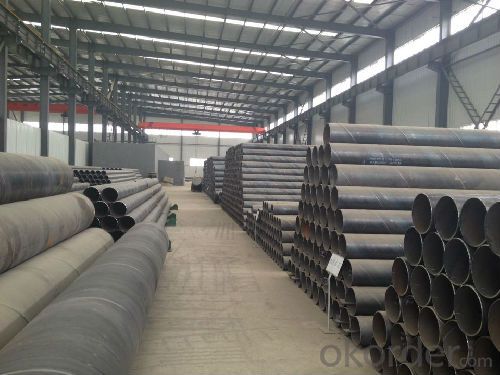
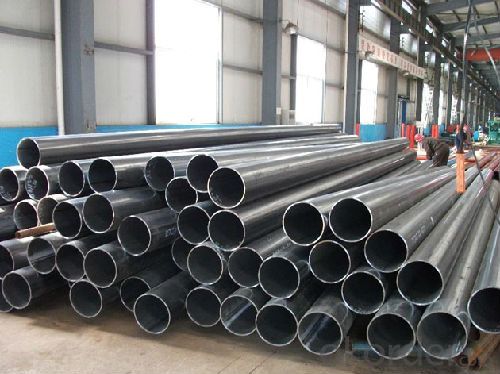
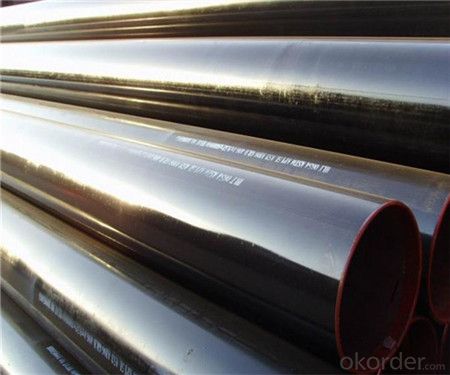
- Q: How are steel pipes used in the manufacturing sector?
- Steel pipes are used in the manufacturing sector for various purposes such as transporting fluids and gases, supplying water, and carrying out structural applications. They are commonly used in industries like oil and gas, construction, automotive, and aerospace for their durability, strength, and resistance to corrosion. Additionally, steel pipes are crucial in the manufacturing of machinery, equipment, and infrastructure, making them essential components in many manufacturing processes.
- Q: What are the different types of steel pipe fittings?
- There are various types of steel pipe fittings, including elbows, tees, reducers, couplings, unions, plugs, caps, and flanges.
- Q: What is the thermal expansion coefficient of steel pipes?
- The thermal expansion coefficient of steel pipes varies based on the particular steel type and the temperature range in which the expansion is measured. On average, the thermal expansion coefficient of steel pipes is between 10-14 x 10^-6 per degree Celsius (10-14 μm/m°C). Thus, for each degree Celsius rise in temperature, the length of a steel pipe will roughly increase by 10-14 μm per meter. It is vital to acknowledge that this value is an average and may slightly differ based on the specific composition and treatment of the steel employed in the pipe.
- Q: How are steel pipes used in the aerospace manufacturing industry?
- Steel pipes are used in the aerospace manufacturing industry for a variety of applications, including fuel and hydraulic systems, structural components, and engine parts. They provide durability, strength, and corrosion resistance, ensuring the safety and reliability of aircraft.
- Q: Are steel pipes magnetic?
- It is true that steel pipes have the ability to become magnetic. Steel, mainly composed of iron, possesses ferromagnetic properties. Consequently, it can be magnetized or drawn towards magnets. Nevertheless, it is important to note that not all steel pipes are magnetic due to the variability in steel's magnetic characteristics, which depend on the specific composition and production methods employed. By incorporating specific alloying elements or subjecting it to particular heat treatments, steel can be rendered non-magnetic in certain instances. Moreover, the strength of the magnetic field exhibited by steel pipes varies based on factors such as pipe thickness and the magnet's intensity.
- Q: How are steel pipes used in the construction of tunnels?
- Steel pipes are commonly used in the construction of tunnels to provide structural support, facilitate drainage systems, and carry various utilities such as water, gas, or electrical cables. These pipes are often installed as part of the tunnel's foundation or as a protective casing for the tunnel's infrastructure.
- Q: How are steel pipes cleaned and flushed?
- Steel pipes are cleaned and flushed using a variety of methods. One common method is high-pressure water jetting, where water is forcefully sprayed through the pipes to remove debris and sediments. Chemical cleaning agents are also used to dissolve any stubborn deposits. Additionally, mechanical methods such as using wire brushes or pigs (devices inserted into the pipes to scrape the interior) can be employed to remove any remaining buildup. Regular maintenance and inspection are crucial to ensure the cleanliness and efficiency of steel pipes.
- Q: How are steel pipes used in the construction of skyscrapers?
- Steel pipes are used in the construction of skyscrapers primarily for their strength and durability. These pipes provide structural support and serve as columns, beams, and foundations, helping to distribute the weight and withstand the immense forces exerted on tall buildings. Additionally, steel pipes are used for plumbing and HVAC systems, allowing for efficient water supply, drainage, and climate control throughout the skyscraper.
- Q: What is lined pipe?
- Pipe lining is a new technology in recent ten years of development, also called composite pipe conveying fluid with different needs, the use of different materials to make the durability of the pipeline inner wall and outer wall of pipeline, to ensure the purity of the fluid, pipeline adaptability, performance is greatly improved, more extensive use.
- Q: What are the different testing methods used for steel pipes?
- To ensure the quality and reliability of steel pipes, various testing methods are employed. These methods include: 1. Non-destructive Testing (NDT): Ultrasonic testing, magnetic particle inspection, and liquid penetrant testing are utilized in NDT to identify surface or subsurface defects in steel pipes without causing any damage. 2. Mechanical Testing: Mechanical testing encompasses various tests to evaluate the mechanical properties of steel pipes, such as tensile strength, yield strength, elongation, hardness, and impact resistance. These tests determine the structural integrity and performance of the pipes. 3. Hydrostatic Testing: This method involves subjecting steel pipes to high-pressure water to assess their ability to withstand expected operating conditions. The pipes are filled with water and pressurized to a predetermined level for a specified duration. Any leaks or deformations are detected during this test. 4. Dimensional Inspection: This testing method ensures that steel pipes meet specified dimensional requirements. It involves measuring critical dimensions such as diameter, wall thickness, and length to verify compliance with applicable standards. 5. Visual Inspection: Trained inspectors visually assess the external appearance of steel pipes using this basic method. They examine the pipes for surface defects such as cracks, corrosion, or irregularities in shape or finish. 6. Chemical Analysis: Chemical analysis is conducted to determine the composition and elemental content of steel pipes. It ensures that the pipes are made from the correct grade of steel and meet required chemical composition standards. 7. Metallographic Examination: Metallography involves examining the microstructure of steel pipes under a microscope to evaluate their quality and integrity. It helps identify internal defects like grain boundaries, inclusions, or improper heat treatment that may impact overall performance. By employing these testing methods, manufacturers and inspectors can guarantee that steel pipes meet necessary quality standards and are suitable for their intended applications.
Send your message to us
API 5L SSAW Carbon Steel Welded Construction Steel Pipe
- Loading Port:
- Tianjin
- Payment Terms:
- TT or LC
- Min Order Qty:
- 20 m.t.
- Supply Capability:
- 15000 m.t./month
OKorder Service Pledge
OKorder Financial Service
Similar products
Hot products
Hot Searches
Related keywords
